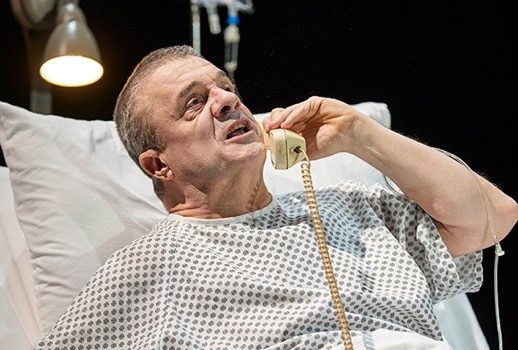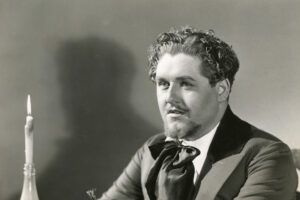

A distinctly American brand of vulgar showmanship
The world is always falling apart. That’s just one of many lessons surfacing in Tony Kushner’s epic Angels In America: A Gay Fantasia on National Themes.
And even though it’s already 2018, twenty five years since the first Broadway production, we are still approaching Millennium with a capital M: oceans rise, coherent systems spin wildly into chaos, vulgarity and power make for intimate bedfellows, and a celebrity sits in the Oval Office.
Fortunately, at least in America, AIDS is no longer a cataclysmic epidemic. Since the play’s composition, the medical community has developed important drugs to staunch the hemorrhaging of American life. But Angels in America isn’t really about AIDS—it’s about “National Themes.” If anything, the play uses AIDS as subject matter to explore more abstract ideas regarding abandonment, change, loss, hope, pain, and solidarity.
Taking his cue from Walter Benjamin’s philosophy of history (most notably, Benjamin’s reading of the Paul Klee painting Angelus Novus), Kushner figures experiences of catastrophe and heartache as acts of progress. As he works through this complex theory, he marshals the great questions of history and politics to present a kind of Gesamtkunstwerkfor America in end times.
While the two-part play is often categorized as an AIDS play, to lump it with similar works of the period seems reductive and lazy. Where plays like Larry Kramer’s The Normal Heart and William M. Hoffman’s As Is make HIV/AIDS the central, primary focus of the drama, Kushner uses the virus as merely one strand in a much larger, cosmological tapestry. In this sense, Angels in America weathers revival better than any other piece of its time—its indefatigable genius tends to the crises of any era.
In a current revival at the Neil Simon Theater, Marianne Elliot’s Broadway production, imported from London’s National Theater, is effectively crepuscular. In this iteration, New York is a city in advent, pregnant with shadowy anticipation. The faithful wait in darkness for revelation. And neon lights barely illuminate figures lost in the gloom; rain falls; snow shimmers against a flat night sky.
Following the text’s seamless, almost cinematic structure, scenes bleed into one another. Dialogue overlaps in kaleidoscopic simultaneity; and the strict logics of realism are abandoned for a richer, more playful theater of the fabulous. As such, a broad canvas is rendered with feverish urgency; transcontinental migration is conveyed by metaphysical means.
Prior Walter, descended from a long line of WASPS, lives with AIDS in New York City. Louis, Prior’s lover, abandons Prior to avoid the emotional baggage of his illness. Meanwhile a married Mormon couple, Joe and Harper Pitt, struggle with the painful truth of Joe’s sexuality. And Roy Cohn, the infamous conservative lawyer and power broker, rails at the heavens as if he were Job arguing with God.
As Hannah, Joe’s shrewd, insensitive mother, comes from Utah to pick up the pieces of her son’s life, the narratives begin to coalesce: Belize, Prior’s friend and former lover, nurses Roy as he battles AIDS; Prior and Harper recognize one another at the threshold of revelation; and, Joe and Louis begin a morally bankrupt affair.
As Prior, movie star Andrew Garfield is a breathless disaster. To begin with, his voice is uncomfortably hoarse, highlighting his lack of endurance. The length and emotional demands of the part require Herculean energy, to be sure, but Garfield covers his blind spots with hollow histrionics. And more egregiously, he indicates Prior’s gayness through a superficial, queer minstrelsy. While Prior does describe his sexual persona as “stereotypical,” his words and actions still evince the flesh and blood of a fully formed human.
It’s on this level that Garfield fails his task. He shrieks and lets his wrists fall limp, but still he lacks the heart and brains to give Prior depth. To be clear, this is not an issue of identity politics (Garfield identifies as heterosexual). I’m not saying that the actor playing Prior needs to have a particular sexual identity; I’m only saying he needs to have talent.
Kushner’s text is extremely musical, requiring a specific ear for camp comedy. This is most evident in the dialogue between Prior and Belize. And as these characters, Garfield and Nathan Stewart-Jarrett both fail to find the right rhythm and cadence to make the words crackle and pop. Where they should be tossing off bon mots with expert comic timing, their jabs and rejoinders fall flat.
For guidance they should turn to Nathan Lane, whose Roy Cohn is a master class in zing! Here, Lane’s tendency for scenery chewing is harnessed to service Roy’s distinctly American brand of vulgar showmanship. He is campy, over-the-top, flamboyant. But still, Lane generously explores the more nuanced qualities of Cohn, a character that remains complex in the national imaginary—as one panel of the AIDS Quilt articulates it: “bully, coward, victim.”
As Louis Ironson, the Scottish James McArdle is wonderfully spontaneous. He handles Kushner’s text with muscular precision. He gives Louis delightful idiosyncrasies, especially when launching into screeds on politics and history. And as his lover Joe, Lee Pace is smoldering and stoical as he bears the closet’s dehumanizing pressure.
Beth Malone plays the Angel for laughs, wisely turning the volume down on the text’s more ponderous theology. She is athletic, working with “Angel Shadows” to choreograph her ferocious flight. And as Hannah Pitt, Susan Brown is acerbic, practical, and painfully pathetic
And then there’s Denise Gough as Harper Pitt, whose beautiful monologue “Night Flight to San Francisco” summarizes the play’s major theme of “painful progress.” Her Harper is desperate, cruel, and sad. Indeed, Harper, perhaps more than any other character in the play, demonstrates the exacting price of freedom—what it costs to take flight from something you love intensely.
It’s interesting to see Angels in America on Broadway at the same time as Mart Crowley’s The Boys in the Band. Both plays represent major shifts—not only in terms of representation in the commercial theater, but also from the point of view of queer political history.
Where Boys coincided with Stonewall, and a heralding of the sexual liberation (and all the anti-social queer theory) it engendered, Angels argues for an ethics of care and a politics of solidarity. It highlights the ways in which we are bound to one another, knitted together in the very fabric of the universe—like particles of soul repairing the ozone layer.
In this sense, one can see how both revivals illuminate the “painful progress” the queer community has had to travel in the last half of the twentieth century. So, take a look around now: here we stand in 2018—Donald Trump is president, global warming threatens a delicate ecosystem, and the apocalypse seems imminent. Has God abandoned us? Hold tight: the world only spins forward; once again the great work begins.
Photo: Brinkhoff & Mögenburg


























Comments